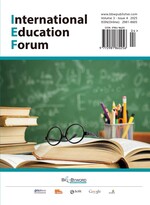Abstract
This article focuses on the development of teachers’ teaching abilities in the context of the new era. Public health emergencies have promoted the deep integration of “Internet plus education”, brought new challenges to teachers’ teaching, and triggered discussions on the improvement of teachers’ teaching ability. Through literature review, this paper combs the research on teachers’ teaching ability and the relevant achievements of teachers’ teaching ability cultivation under the background of “Internet plus”, and finds that the existing research provides a theoretical basis for the development of teachers’ teaching ability, but still needs to further explore optimization strategies. The new era has put forward new requirements for teachers’ teaching, including the modernization of educational concepts, comprehensive information literacy, and lean teaching levels. To enhance the teaching ability of teachers, strategies such as prioritizing the transformation of teacher roles, scientifically cultivating and comprehensively improving teacher quality, creating an environment to optimize technical support, relying on technology to build a network teaching and research system, and incentivizing and regulating the construction of a scientific evaluation mechanism should be adopted, aiming to help teachers adapt to the development needs of education in the new era and improve teaching quality.
References
Wang L, Wei YL, Hu JH, et al., 2018, Research on the Composition and Level Hierarchy Model of Teacher Teaching Ability System. Teacher Education Research, 30(6): 16–24.
Wang GM, Zhang YJ, Wu LB, 2018, The Connotation, Constituent Elements, and Cultivation of Teachers’ Core Competencies. Education Science, 34 (4): 47–54.
Wang P, Guan WJ, Wang Y, 2010, The Connotation and Structure of Educational and Teaching Abilities of Primary and Secondary School Teachers. Curriculum, Textbooks, and Teaching Methods, 30(6): 92–96.
Zhang JH, 2020, Research on the Problems and Countermeasures of Undergraduate Teaching Ability of College Teachers. China Higher Education Research, 2020(5): 9–16.
Han JZ, Peng DM, Du WL, 2016, Research on the Current Situation and Countermeasures of Teaching Ability of Newly Employed Teachers in Ordinary High Schools. Teaching and Management, 2016(18): 69–71.
Li C, 2017, Research on the Composition and Influencing Factors of Teaching Ability of College Teachers. Heilongjiang Higher Education Research, 2017(1): 103–105.
Wei XY, Ji ZC, Zhou P, et al., 2011, Empirical Study on the Factors Influencing and Improvement Measures of Teaching Ability of Young College Teachers. Modern Education Management, 2011(7): 75–78.
Li W, Du J, Wang YN, 2018, Analysis of Factors Affecting the Information Technology Application Ability of Backbone Teachers in Primary and Secondary Schools in Areas with Weak Information Construction. China Electronic Education, 2018(3): 115–122.
Jia JY, Wang Q, Chen WC, 2008, Quantitative Analysis of the Impact of Teacher Information Literacy: A Case Study of the Information Literacy Survey of Information Technology Teachers in Primary and Secondary Schools in Beijing. Research on Electronic Education, 2008(8): 37–42.
Tang YW, Fan JR, Pang JW, et al., 2019, Research on Precise Training Strategies for Informationized Teaching Ability of Regional Primary and Secondary School Teachers under the Humanistic Service Concept. China Electronic Education, 2019(11): 113–119.
Chen BH, 2019, Research on the Development of Teaching Ability of Private Undergraduate College Teachers from the Perspective of Industry Education Integration. Education Academic Monthly, 2019(8): 97–102.
Zhao HC, Ma JW, Jiang C, et al., 2019, Reflection and Suggestions on the Improvement of Teaching Ability of Maker Teachers. Modern Educational Technology, 29(5): 119–125.
Zhang Z, Chen XH, Wang YN, 2017, Research on the Evaluation of Teacher’s Informationized Teaching Ability Based on TPACK Model. Modern Distance Education, 2017(6): 66–73.
Huang CG, 2010, Research on Enhancing Teachers’ Information Technology Teaching Ability through Blended Learning Mode. Modern Educational Technology, 20(7): 62–65.
Li TL, Ma Li, 2013, Research on the Development Status and Countermeasures of Informationized Teaching Ability of Young University Teachers: A Case Study of Universities in Xi’an. Modern Educational Technology, 23(6): 34–37.
Wu D, Hu YL, Gu XQ, 2016, Empirical Study on the Integration Ability of Information Technology and Curriculum for New College Teachers: Based on the Pre-service Training Program for Teachers in Shanghai Municipal Universities. Modern Distance Education Research, 2016(3): 77–83 + 103.
Zhao CL, Zhou L, Liang YZ, et al., 2017, Research on Personal Influencing Factors of Vocational College Teachers in Information Technology Teaching. Modern Distance Education, 2017(1): 57–62.
Zhu Y, 2016, Research on Strategies for Enhancing the Informationized Teaching Ability of Primary and Secondary School Teachers. Education Review, 2016(1): 116–119.
Yang N, Bao ZW, Dong YQ, 2014, Analysis of the Influencing Factors Model on the Development of Information Technology Teaching Ability of Normal University Students: Based on in-depth Interviews with Fourth Grade Normal University Interns. Research on Electronic Education, 35(5): 103–107.
Zhang L, 2019, York Vogt Cultivation of Information Technology Teaching Ability for Teacher Education Students Integrated into Disciplines: Experience from the Netherlands. Education Development Research, 39(4): 44–53.
Jiang L, Han XB, 2018, Analysis Framework for the Transfer of Information Technology Teaching Ability Training for College Teachers. China Electronic Education, 2018(4): 17–25.
Wang R, 2018, Research on Regional Teacher Training Strategies Based on Positive Feedback of Cloud Services. Research on Electronic Education, 39(12): 123–128.
Yang XZ, Zhang YJ, 2020, Analysis of Online Teaching and Training for Primary and Secondary School Teachers under Epidemic Prevention and Control. Modern Educational Technology, 30(3): 5–11.
